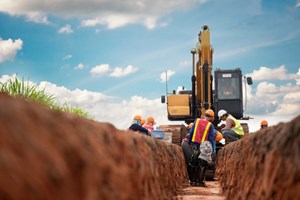Texas trench fatalities rise despite OSHA safety regulations
(UI) — Trench collapses continue to be a leading cause of preventable worker deaths in Texas, despite existing safety regulations set by the Occupational Safety and Health Administration (OSHA), according to Texas Public Radio.
Over the last decade, more than 20 Texans have died in trench accidents, including 41-year-old plumber Jack Martin, who was buried alive while working on a sewer line in Houston in 2019. Despite expressing concerns and requesting trench boxes to stabilize the trench walls, his employer refused, citing cost concerns.
Martin's case is one of many highlighting the critical safety failures in trenching. Nationwide, over 250 workers have lost their lives in trench collapses, which occur when the walls of an excavation become unstable due to factors like soil type, machinery vibrations, or weather conditions. OSHA mandates protective systems such as trench boxes for trenches deeper than five feet and requires trained supervisors on-site with the authority to halt work if conditions are deemed unsafe.
Even with these safety measures, enforcement and penalties remain inconsistent. In Martin's case, his employer was initially fined nearly $19,000, but the amount was later reduced. Similarly, other Texas employers have faced fines after deadly incidents but rarely see criminal charges. Out of 250 trench-related deaths in the U.S. in the past ten years, only 11 cases resulted in criminal prosecution, none of which were in Texas.
Experts argue that stronger enforcement and harsher penalties are needed to prevent these fatalities. David Michaels, a former OSHA assistant secretary, advocates for more criminal referrals in cases of trench fatalities, suggesting that the threat of jail time for employers would have a more significant deterrent effect than fines, according to Texas Public Radio.
With increased federal infrastructure funding set to boost construction activity, putting more workers at risk in hazardous trenches, the need for stricter safety enforcement and compliance is becoming increasingly important to prevent further fatalities.
Related News
From Archive

- Glenfarne Alaska LNG targets late-2026 construction start for 807-mile pipeline project
- U.S. water reuse boom to fuel $47 billion in infrastructure spending through 2035
- $2.3 billion approved to construct 236-mile Texas-to-Gulf gas pipeline
- Major water pipe break in Puerto Rico hits over 165,000 customers
- Potomac River Tunnel project enters construction phase beneath Washington, D.C.
- Pennsylvania American Water launches interactive map to identify, replace lead water service lines
- Trump's tariffs drive $33 million cost increase for Cincinnati sewer project
- Utah city launches historic $70 million tunnel project using box jacking under active rail line
- Tulsa residents warned after sewer lines damaged by boring work
- Fatal trench collapse halts sewer construction in Massachusetts; two workers hospitalized




Comments